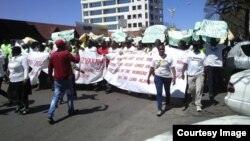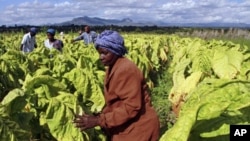Workers and business executives in Zimbabwe’s Chinhoyi town, Mashonaland West province, have expressed mixed views over the new year with some saying the future looks bleak for most people due to lack of jobs as a result of the shrinking economy.
But some are optimistic that the economy will rebound if all stakeholders focus on reviving industries and other sectors.
Civil servant, Obert Karinga of Chokonohono high density suburb, is a disappointed man, as he has not yet received his 13th check after the government decided to stagger the payment of bonuses in 2014, owing to dwindling finances.
“It’s all gloom and doom, especially moreso when you have a government failing to pay its workers on time, it may mean that we may resort to the Zim dollar which may be very costly to the country as well,” says Karinga.
To compound his misery, Karinga says government failed to pay workers on time. He says the staggering of bonuses might be a bad indicator of worse days ahead.
Businessman Abisha Karonga, concurs, saying 2015 is likely to be worse than last year as the cost of producing goods for sale continues to rise while fixed overheads are too high.
He says, “The cost of production here, or the cost of overheads, is very high. I can’t invent anything.”
But private construction worker, Kenny Nyakotye, is optimistic that the country’s economy will improve this year.
HARVESTS
Nyakotye pins his hopes on agriculture, saying Zimbabwe is likely to record a bumper crop harvest this year as it is currently receiving some heavy rains.
Agriculture used to be the mainstay of the economy until the late 1990s when the Zimbabwe economy started crumbling due to various factors, including hyperinflation and internal political conflicts.
Nyakotye further says politicians in the ruling Zanu PF party, fond of fighting over trivial issues at times, are expected to focus on reviving the ailing economy.
“The new leadership, I think it’s going to bring us a better life, a better economy to the country,” he says.
His views are echoed by Karonga, who bemoans the lack of harmony among all stakeholders in tackling the economy, which according to government was set to grow by more than three percent in 2014.
“As a country, we are divided, so that’s one thing that’s not good for the country. We need to come up with a social contract, the government, business and even labor must be in harmony, in order for us to move forward,” he says.
LACK OF CAPITAL
Although various sectors of the economy are struggling to survive due to lack of capital and other issues, some Chinhoyi residents say the country should re-introduce its own currency.
They believe, without elaboration, that it is improper to use the United States dollar, Botswana pula, South African rand and other currencies.
According Nyakotye, such moves will complement what he calls commendable efforts taken by the government to introduce special bond coins minted in South Africa.
“There’s nothing bad about these coins, I think it was long overdue. In fact, in 2009 when they introduced this multicurrency, whatever, we were not supposed even to have killed our own currency.”
The coins, which have the same value as the United States cents and are in denominations of one, five, 10, and 25 cents, were released into the money market two weeks ago.
Zimbabwe adopted a multiple currency system in 2009 owing to historic hyperinflation.
COINS
Some Zimbabweans are refusing to use the coins, claiming that the country is attempting to re-introduce the dumped Zimbabwe dollar. Central bank governor John Mangudya has dismissed these suggestions, saying local people will not be forced to use the coins worth $10 million.
Local commuter, Peter Ngondowe, believes that Zimbabwe made a big blunder when it introduced the coins in an effort to tackle the general shortage of change in the country.
Despite most of these challenges, some Chinhoyi residents still hope for the best in 2015, saying the government should tackle corruption, implement relevant policies to attract foreign investors and engage both the West and Asia in order to create a condusive environment for significant economic growth this year.






